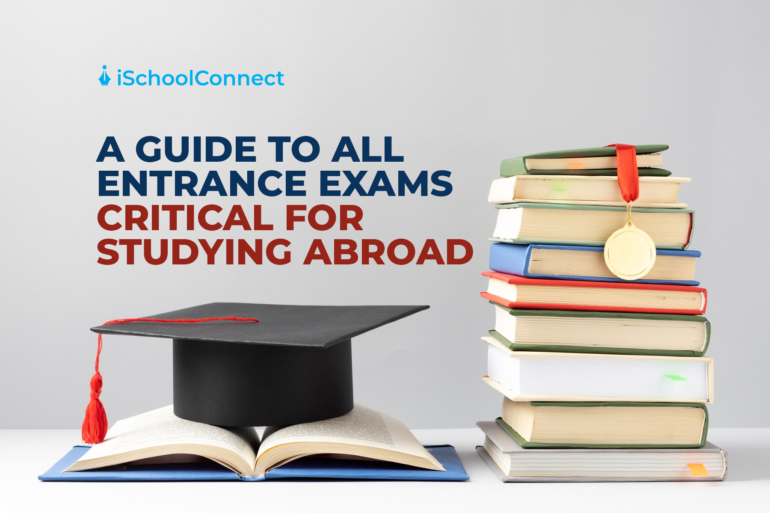Table of Contents
The significance of international entrance examinations
For many students, studying abroad offers the chance to further their education, experience different cultures, and develop personally. However, passing entrance exams is necessary to get admission to esteemed international universities. Knowing more about entrance examinations for studying overseas and understanding the exams associated with scholarships is essential. Let’s discuss the points in detail in this blog.
Common study abroad exams
Following are the entrance exams that international students might have to appear for to study abroad.
- IELTS (International English Language Testing System): Widely recognized and accepted by universities in English-speaking countries, IELTS evaluates a student’s proficiency in the English language. Divided into four sections such as listening, reading, writing, and speaking, IELTS provides a comprehensive assessment of language skills. Preferred by universities in the UK, Australia, Canada, and New Zealand, non-native English speakers should prepare for this exam dedicatedly.
- TOEFL (Test of English as a Foreign Language): Similar to IELTS, TOEFL assesses English language proficiency but in an American English context. Commonly required by U.S. universities, TOEFL has global recognition and evaluates skills in reading, listening, speaking, and writing. TOEFL provides flexibility for test-takers by offering an internet-based test (iBT) and a paper-based test.
- SAT (Scholastic Assessment Test): Widely used for undergraduate admissions in the United States, the SAT assesses mathematical and evidence-based reading and writing skills. While not mandatory for all international students, many top U.S. universities consider SAT scores during the admission process. Preparation is key to success in the SAT, and numerous resources are available for this exam, including practice exams and study guides.
- GRE (Graduate Record Examination): Essential for graduate programs in various fields, the GRE assesses analytical writing, verbal reasoning, and quantitative reasoning. Accepted by a vast number of international universities, the GRE is a crucial step for those pursuing postgraduate studies abroad. Preparation for the GRE involves mastering the syllabus and understanding the exam’s format and structure.
Exams to study abroad with scholarships

One must navigate the landscape of entrance exams associated with coveted international scholarships to access them. These entrance exams are-
- SAT for scholarships: Many universities, especially in the United States, consider SAT scores when awarding scholarships. Performing well in the SAT can open doors to merit-based scholarships, reducing the financial burden on students and their families. Students aiming for scholarships should focus on achieving high scores on the SAT, demonstrating academic prowess.
- Commonwealth Scholarship and Fellowship Plan (CSFP): Governed by the Commonwealth Scholarship Commission, CSFP offers scholarships to students from Commonwealth countries. These scholarships cover a variety of disciplines and provide opportunities for both undergraduate and postgraduate studies. Applicants might have to clear specific qualifying exams and interviews, varying by country and course, as eligibility criteria vary for each scholarship.
Exams for specific program requirements
Some programs may have unique entrance requirements. For example, business schools often require the Graduate Management Admission Test (GMAT), while law schools may consider the Law School Admission Test (LSAT).
Let’s explore how certain programs have distinct entrance exams to ensure applicants possess the specialized skills and knowledge required for success.
Business schools and the GMAT
Aspiring business leaders pursuing prestigious MBA programs globally often have to appear for the Graduate Management Admission Test (GMAT). Widely recognized by business schools worldwide, the GMAT evaluates analytical writing, integrated reasoning, quantitative aptitude, and verbal skills.
The GMAT serves as a crucial benchmark for assessing an applicant for the rigorous curriculum of business management programs. It goes beyond measuring academic prowess and delves into analytical and critical thinking abilities.
While not all business schools exclusively require the GMAT, many consider it a valuable metric for evaluating candidates. Some schools may also accept the Graduate Record Examination (GRE) as an alternative, providing flexibility for prospective MBA students.
Law schools and the LSAT

The legal field mandates a distinctive entrance exam known as the Law School Admission Test (LSAT). Designed to assess skills essential for success in law school, the LSAT evaluates analytical reasoning, logical reasoning, and reading comprehension.
Global law schools, especially in the United States and Canada, often prioritize LSAT scores during the admissions process. The exam measures the critical thinking and analytical skills crucial for legal professionals.
Much like the GMAT, the LSAT is essential in distinguishing candidates based on their ability to navigate complex legal scenarios and make informed decisions.
Medical schools and the MCAT
Prospective medical students might have to appear for the Medical College Admission Test (MCAT). It assesses the aptitude and knowledge necessary for success in medical education. The MCAT covers sections such as biological and biochemical foundations, critical analysis, and reasoning skills.
Medical schools, particularly in the United States and Canada, heavily weigh MCAT scores when evaluating applications. The exam aims to ensure that aspiring physicians possess a strong foundation in the sciences and critical thinking skills essential for medical practice.
The MCAT is a comprehensive assessment that goes beyond traditional entrance exams. It reflects the specialized nature of the medical profession and the multifaceted skills required for success.
How to prepare for study abroad entrance examinations
Success in entrance exams depends on strategic preparation and careful planning. Here are some insights to help you succeed in study abroad entrance exams-
- Research exam requirements- Understand the specific requirements of the entrance exams for the country and course you’re interested in. Know the exam format, subjects, and scoring criteria.
- Create a study schedule- Develop a realistic study schedule that allocates sufficient time for each subject. Break down the topics and set milestones to track your progress.
- Use official study materials- Utilize official study materials provided by exam authorities. This ensures that you are focusing on the right content and are familiar with the exam structure.
- Practice regularly- Regular practice through sample papers, mock tests, and previous years’ question papers helps you understand the exam pattern, manage time efficiently, and identify areas for improvement.
- Seek professional guidance- Consider joining coaching classes or hiring a tutor if needed. Professional guidance can provide insights, tips, and personalized strategies to enhance your preparation.
- Stay informed- Keep yourself updated on any changes in the exam pattern or syllabus. Follow official announcements and subscribe to reliable sources for exam-related news.
- Improve language skills- For exams with language proficiency requirements, focus on improving your language skills through reading, writing, listening, and speaking exercises.
- Healthy Lifestyle- Maintain a balanced lifestyle with adequate sleep, regular exercise, and a healthy diet. Physical well-being contributes significantly to mental sharpness and concentration.
- Review and Revise- Regularly review what you’ve studied and revise important concepts. This helps reinforce your understanding and ensures better retention.
- Stay Positive and Confident- Cultivate a positive mindset and stay confident in your abilities. Visualization techniques and positive affirmations can help manage exam stress.
Key takeaways
- Studying abroad offers a chance for academic, cultural, and personal development, but passing specific entrance exams is often a prerequisite for admission to esteemed international universities.
- Certain programs, such as business and law schools, have unique entrance requirements. Business schools often require the GMAT, while law schools may consider the LSAT.
- success in study abroad entrance examinations is achievable through a combination of strategic preparation, a positive mindset, and careful planning.
Discover more insights and get personalized assistance for your study abroad aspirations. Click here to contact us and let our experts guide you through the international education journey.
Liked this blog? Read next: Study abroad in Germany | Its rise and challenges
FAQs
Q1. Which entrance exam is best for abroad studies?
Ans- The most significant international entrance examinations for studying abroad include the GRE, TOEFL, SAT, GMAT, Duolingo, PTE, MCAT, and LSAT. These exams are essential for skill evaluations and entrance to international universities and colleges.
Q2. What are the international exams to study abroad after completing 12th grade?
Ans- After completing their higher secondary education, students can appear for various entrance tests to pursue higher education overseas. Some significant standardized examinations that students take to prepare for studying abroad are the SAT, ACT, GRE, TOEFL, and IELTS.
Q3. Are there any entrance exams to study humanities abroad?
Ans- HSEE, TISS BAT/ CUET, and FEAT are some of the most popular entrance exams to study humanities abroad.
Q4. Which exam is easy for study abroad?
Ans- The perceived difficulty of study abroad entrance exams varies among individuals based on their strengths, preparation, and familiarity with the exam format. Popular exams, such as the TOEFL and IELTS for language proficiency and the GRE or GMAT for graduate programs, are the exams that students have to appear for.






